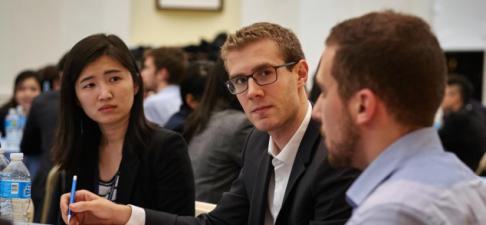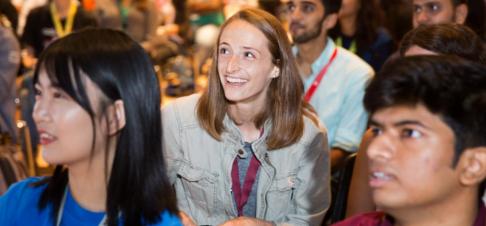Global Engineering Track
The Global Engineering Track (GET) is an elective specialization available to Master of Science students at Columbia Engineering.
Why GET?
Participation in the Global Engineering Track (GET) elective specialization provides students an opportunity to obtain real-world experience during their studies and prepares them for post-graduation career opportunities.
GET requires students to enroll in ENGI E4201 GET Fieldwork as well as the ENGI E4200 Global Engineering Concepts course.
Summer fieldwork must be at least 6 weeks in length and can consist of an internship in industry (in the US or globally), a research/academic internship, or an industry project supervised by faculty in partnership with organizations/corporations.
ENGI E4200 and ENGI E4201 are additional courses above the general requirements of the student’s Master of Science program. Participation in GET does not preclude students from also specializing in any of the concentrations, tracks, and specializations offered by their M.S. program.
Students admitted into GET 2024 can withdraw from the GET specialization anytime before March 21, 2024, by emailing [email protected].
Frequently Asked Questions
Who is eligible to participate in GET?
The GET track is open to Master of Science students at Columbia Engineering, domestic and international.
How does one apply for GET?
Applications for GET 2024 are closed.
Students admitted into GET 2024 can withdraw from the GET specialization anytime before March 21, 2024, by emailing [email protected].
What if I'm interested in applying for GET 2025 or later?
If you have questions about applying to a later cohort, please email [email protected].
What does GET entail?
Students in GET must participate in mandatory summer fieldwork (6 weeks minimum), in the U.S. or globally. GET students must also enroll in the required 3-credit Global Engineering Concepts course (ENGI E4200) in the fall term after completing GET Fieldwork.
What type of fieldwork counts towards the GET requirement?
Students who are enrolled in the GET specialization can choose to do a summer internship in industry (in the U.S. or globally), a research/academic internship, or an industry project supervised by faculty in partnership with organizations/corporations.
When will I complete GET Fieldwork?
GET Fieldwork is completed in the summer term. The earliest that GET 2024 Fieldwork experiences may begin is May 13, 2024.
Students must complete 12 credits towards their degree program prior to the start of GET Fieldwork.
All fieldwork experiences must end on or before September 2, 2024.
Can I extend my summer fieldwork into the fall term?
CPT for GET Fieldwork only covers experiences during the summer term. Students interested in fall internships must qualify separately for elective CPT. Although students may be eligible for elective CPT with the same employer following GET Fieldwork, the scope of work for a fall internship must be different than the work performed during the summer. For questions about elective CPT eligibility and extension into the fall term, please consult your academic department.
Are GET students guaranteed a summer internship or research placement? Will I get assistance in finding an internship?
Participation in GET does not guarantee summer internship placement. It is the responsibility of each student to seek out these opportunities. It is important to start your search early utilizing the many resources available to you including: your career placement officer, your academic department, the Columbia Engineering Graduate Career Placement team, and the Professional Development & Leadership team.
What requirements do I need to complete prior to starting GET Fieldwork?
Students enrolled in the GET specialization must complete 12 credits towards their M.S. program prior to the start of GET Fieldwork.
All students must also complete the GET Fieldwork Certification form to be sure their fieldwork is approved, prior to their intended start date. The GET Team will begin reviewing fieldwork requests in late March though we recommend students submit their requests as soon as possible. The GET Team requires 7-10 business days to review and process your fieldwork request. For F-1 visa holders, ISSO will require an additional 7-10 business days for processing CPT requests.
I am an international student enrolled in the GET specialization. Am I eligible for CPT during summer 2024, even if I start my M.S. program in spring 2024?
Yes. International students enrolled in the GET specialization may be eligible to use CPT for an internship during summer 2024 so long as they complete 12 credits towards their M.S. program prior to the start of the internship.
How much does GET cost?
Students will be required to pay tuition for the ENGI E4200 Global Engineering course (3 credits, tuition-bearing). ENGI E4201 GET Fieldwork is 1 credit, non-tuition-bearing. These 4 credits are in addition to a student's program requirements.
What if I do not finish the GET requirements?
If you are unable to finish the GET requirements (i.e. GET Fieldwork and GET Course), you may drop the specialization prior to March 21, 2024. However, once the deadline to drop has passed, you must complete the GET specialization requirements in order to obtain your MS degree.
The last day to drop the GET specialization is March 21, 2024, for the GET 2024 cohort.
What if I want to drop the GET specialization?
Students admitted into GET 2024 can withdraw from the GET specialization anytime before March 21, 2024, by emailing [email protected]. You may not drop the GET 2024 specialization after this date; late requests to drop will not be accepted.

Graduate Career Placement
GET Students will work closely with their Career Placement Officer to secure fieldwork for the summer. The Graduate Career Placement website is also filled with useful information and resources to assist students.

Professional Development + Leadership
Students participating in GET will work closely with the Professional Development and Leadership (PDL) team. PDL assists students with in a number of ways, including:
1. Obtain skills to find and keep a job.
2. Learn how to cultivate a career.
3. Recognize effective leadership.
4. Demonstrate ethical behavior and values.
5. Promote well-being, kindness and respect.
